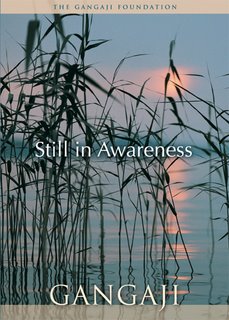Q: The question is, is there ever a time when awareness is no longer
overshadowed by emotion?
G: Actually all the time. All the time. What happens is that
individual awareness, which is a ray of universal awareness, gets
fixated on a loop of emotional drama. But if at any point in that
loop, the individual mind stops and investigates — all the way, then
whatever the emotion, there is instant clarity. So then, every emotion
is a vehicle. Every moment of every emotion is a vehicle. Awareness is
not overshadowed by anything. Ever.
Q: Yes.
G: Ever. We speak of awareness, but often what we are talking about,
is a state of awareness. It gets called mindfulness, or equanimity, or
samadhi, or clarity. Those are states of awareness. And then we also
have what we call the negative states: confusion, anxiety, lack of
equanimity, negativity. Those are also states of awareness. But you
cannot have any of those states without awareness. This is not
illogical. This is very logical. You can also have awareness without
any state. You do not need any state for awareness, as some people
here have discovered. There can be a moment when nothing is happening,
when there is just awareness: as you just said, "no trees, no me".
There is just awareness and then the trees reappear. Does awareness
disappear? Well how did you know there were trees, if awareness
disappeared? How did you know there were no trees if awareness
disappeared when there were no trees?
So what happens as a result of spiritual conditioning, is that we
learn to equate the elevated state with the truth of awareness, rather
than recognizing that awareness is present in all states. Awareness is
omnipresent. Awareness is God. It is always here, omniscient.
Awareness knows everything, is aware of everything. That does not mean
that it is some powerful "thing" that knows what you are thinking, and
that you blinked or you didn't blink. It means that everything that
occurs or does not occur occurs in the presence of awareness. The
shift that can occur in individual awareness happens when you
recognize that you are here, regardless of emotion or state. Emotions
are like weather. So the winds came up this morning and there were
white caps on the lake, and then rain came. But here you are. You did
not change. Life did not change. Individual awareness drops deeper and
deeper into its source. I am not saying that you have to "stay in the
source" because you can not be separate from the source. If you are
trying to "stay in the source", then there is still some latent belief
that "if I do not stay here, then I will not be aware." This is fluid,
effortless being.
Identification with particular states of awareness is perhaps part of
the organism or part of the evolution, but it is a source of suffering
because there is identification as a sufferer. The sufferer is an
image that appears in awareness, and gets identified as "me" and is
associated with the physical body. But always there is awareness,
aware of the suffering, aware of the sufferer, aware of
identification, and yet free of that. The mystery is how it gets
overlooked. But you don't have to solve that mystery. Just stop
overlooking it. Just tell the truth.
Gangaji
States of awareness
Silver Bay, New York
Retreat - September 25, 2003
http://www.gangaji.org/satsang/library/excerpts/states.asp


